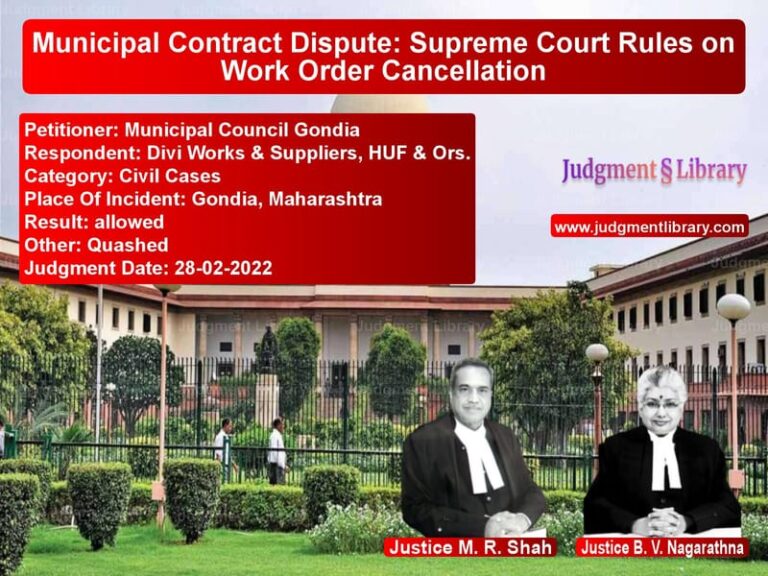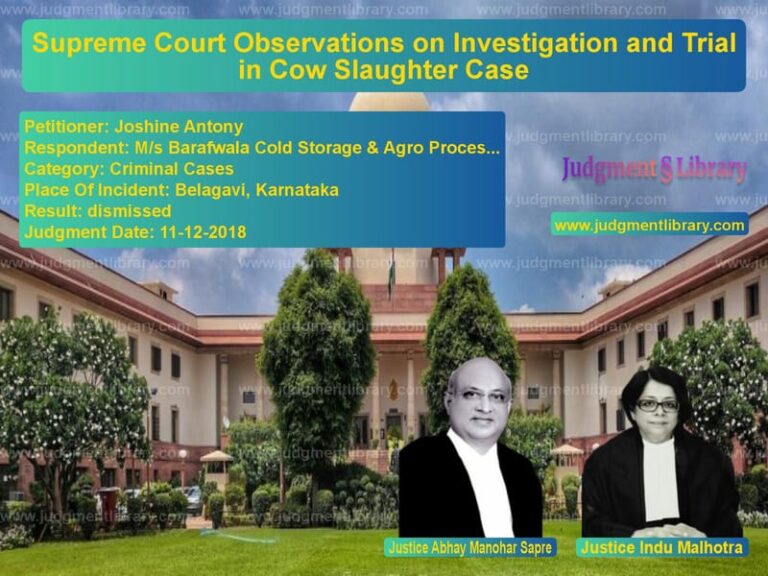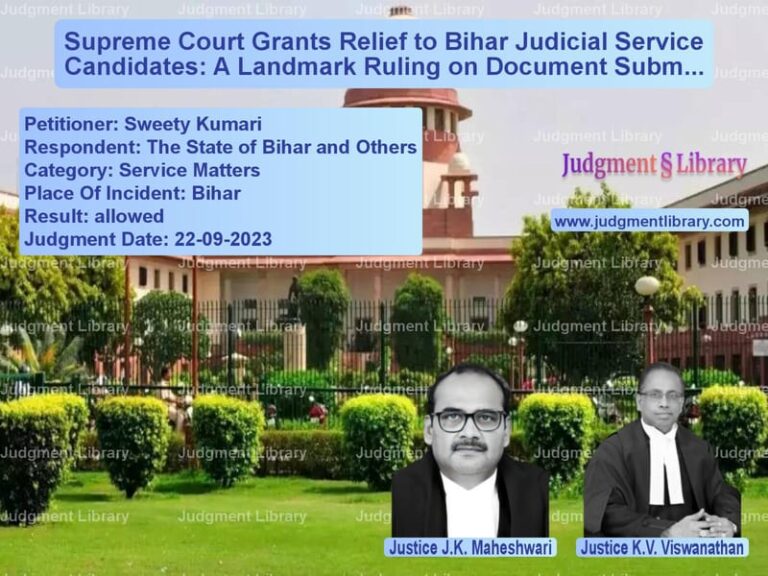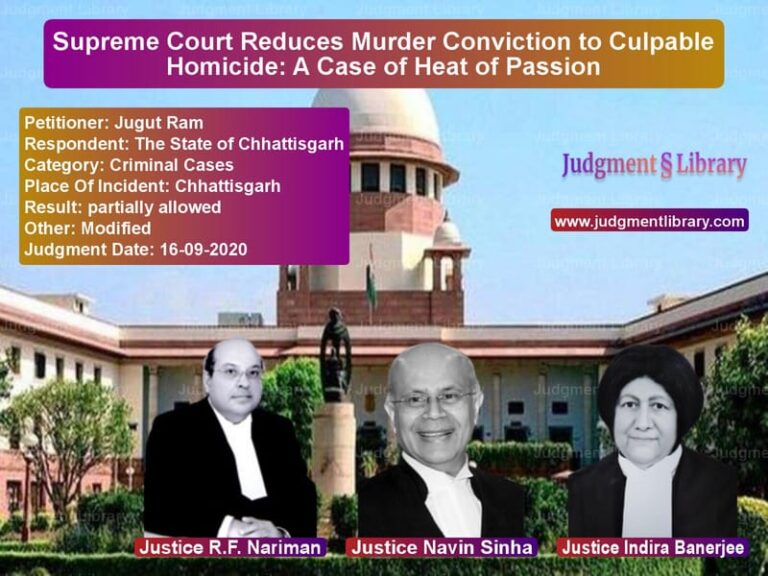Supreme Court Strikes Down Arbitrary Parole Conditions in Gujarat Life Sentence Remission Case
The Supreme Court of India has ruled in the case of Mafabhai Motibhai Sagar vs. State of Gujarat & Others, addressing the legality of conditions imposed on life sentence remission. The case involved the appellant’s challenge to conditions imposed by the Gujarat government while granting him remission under Section 432 of the Code of Criminal Procedure (CrPC), 1973. The ruling clarifies the scope of remission powers and protects the rights of convicts post-release.
Background of the Case
The appellant was convicted under Section 302 read with Sections 147 and 148 of the Indian Penal Code (IPC) and was sentenced to life imprisonment on February 18, 2008. After serving a substantial period of his sentence, he applied for remission.
On September 15, 2023, the Home Department of the Government of Gujarat granted remission, reducing the remaining portion of his sentence. However, the remission order imposed the following four conditions:
- The appellant must behave “decently” for two years post-release and provide two sureties ensuring he does not disturb societal peace or intimidate witnesses.
- If he commits any cognizable offense or inflicts serious harm to any individual or property post-release, he will be re-arrested and made to serve the remaining sentence.
- He must report to the nearest police station for one year after his release.
- He would only be released after paying any pending fine.
Aggrieved by the first two conditions, the appellant filed a petition challenging their legality.
Petitioner’s Arguments
- The petitioner contended that the conditions imposed were vague, arbitrary, and unconstitutional.
- He argued that the term “decent behavior” was subjective and open to arbitrary interpretation, violating Article 14 of the Indian Constitution.
- He asserted that condition No. 2, which provided for automatic re-arrest upon committing a cognizable offense, violated Article 21, as a convict should not be reincarcerated without due process.
- The petitioner emphasized that remission, once granted, must be final, and any breach of conditions should be subject to proper legal procedures.
Respondent’s Arguments
- The State of Gujarat argued that remission was a discretionary power of the government under Section 432(1) of CrPC.
- The government justified the conditions as a preventive measure to ensure the appellant did not violate public order.
- The respondents contended that the appellant had accepted the conditions and had already furnished sureties, making it legally binding.
- They cited previous Supreme Court judgments that upheld the government’s authority to impose conditions while granting remission.
Supreme Court’s Observations
1. The Subjectivity of “Decent Behavior”
The Court ruled that the phrase “decent behavior” was unconstitutionally vague and unenforceable.
“The words ‘decent’ or ‘decently’ are not defined in the CrPC or any cognate legislation. The concept of decency is subjective and varies from person to person. Such conditions provide unchecked power to the authorities, violating Article 14.”
Thus, the Court struck down condition No. 1 as being manifestly arbitrary.
2. Violation of Natural Justice in Automatic Re-arrest
The Court found condition No. 2 to be unlawful, as it allowed automatic re-arrest without following due process. It emphasized that merely committing a cognizable offense does not automatically justify the cancellation of remission.
Read also: https://judgmentlibrary.com/supreme-court-quashes-conviction-in-fake-caste-certificate-case/
“The registration of a cognizable offense against a convict, per se, is not a ground for automatic cancellation of remission. The convict must be given an opportunity to be heard before any action is taken under Section 432(3) of CrPC.”
The Court ruled that breach of parole conditions cannot lead to automatic imprisonment and must be adjudicated through proper legal procedures.
3. Due Process in Remission Cancellation
The judgment clarified that remission is an act of clemency, but once granted, it cannot be arbitrarily withdrawn. The Court held:
“Remission once granted restores the liberty of a convict. Any cancellation of remission must comply with principles of natural justice.”
It further stated that any breach of parole conditions must be evaluated on a case-by-case basis.
Final Judgment
- Condition No. 1 (regarding “decent behavior”) was struck down as unconstitutional.
- Condition No. 2 (automatic re-arrest upon committing a crime) was clarified to require due process before revocation of remission.
- The remission order remained valid, subject to these modifications.
- The State of Gujarat was directed to comply with the judgment’s principles in future remission orders.
Conclusion
This ruling sets a vital precedent on the limits of executive discretion in parole and remission cases. It ensures that conditions imposed on convicts post-release must be reasonable, unambiguous, and legally enforceable. The Supreme Court’s decision safeguards the rights of individuals who have been granted remission while maintaining the government’s authority to impose legitimate conditions.
Petitioner Name: Mafabhai Motibhai Sagar.Respondent Name: State of Gujarat & Others.Judgment By: Justice Abhay S. Oka, Justice Augustine George Masih.Place Of Incident: Gujarat.Judgment Date: 21-10-2024.
Don’t miss out on the full details! Download the complete judgment in PDF format below and gain valuable insights instantly!
Download Judgment: mafabhai-motibhai-sa-vs-state-of-gujarat-&-o-supreme-court-of-india-judgment-dated-21-10-2024.pdf
Directly Download Judgment: Directly download this Judgment
See all petitions in Bail and Anticipatory Bail
See all petitions in Custodial Deaths and Police Misconduct
See all petitions in SC/ST Act Case
See all petitions in Judgment by Abhay S. Oka
See all petitions in Judgment by Augustine George Masih
See all petitions in partially allowed
See all petitions in Modified
See all petitions in supreme court of India judgments October 2024
See all petitions in 2024 judgments
See all posts in Criminal Cases Category
See all allowed petitions in Criminal Cases Category
See all Dismissed petitions in Criminal Cases Category
See all partially allowed petitions in Criminal Cases Category







